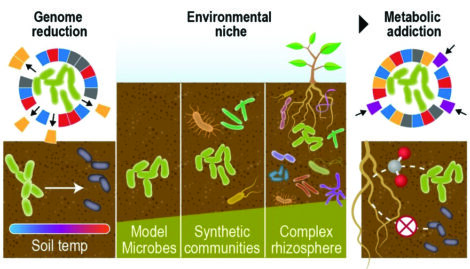Build on advances in genome science and synthetic biology to design and engineer DOE-relevant biological systems with built-in biocontainment measures and develop strategies to address risks of unintended consequences, while enabling a sustainable bioeconomy.

Persistence Control of Engineered Functions in Complex Soil Microbiomes. Led by Pacific Northwest National Laboratory (PNNL), the Persistence Control project uses the mechanisms of genome reduction and metabolic addiction to drive secure rhizosphere community design for robust biomass crops. This is one of several new national laboratory projects in secure biosystems design supported by GSP. [Courtesy PNNL]
Some aims of GSP secure biosystems design research include:
- Develop approaches to understand and enhance stability, resilience, and controlled performance of DOE-relevant plant and microbial systems in their natural environments.
- Research novel biocontainment strategies, such as gene drives, non-natural metabolite dependency, and genetic isolation, as well as prevention of evolution and horizontal gene transfer.
- Develop computational and experimental strategies to detect, predict, and ameliorate the effects of engineered organisms in different environments.
- Explore the potential for engineering plants, microbes, and microbiomes to detect or control other engineered organisms released into the environment.
